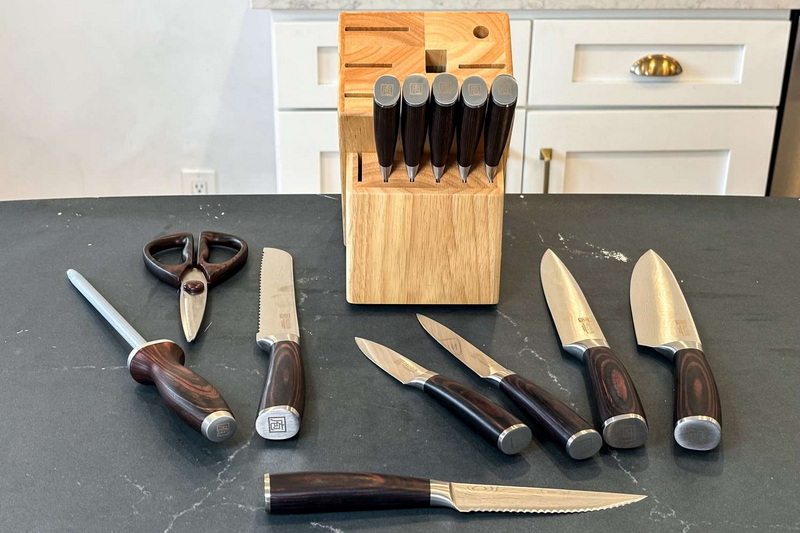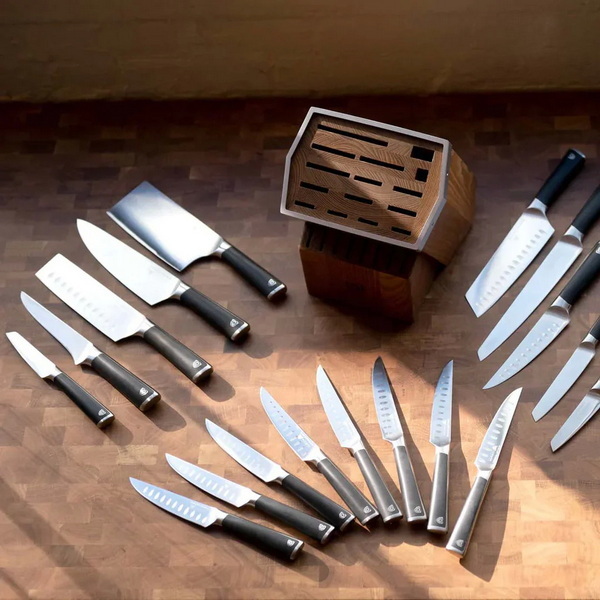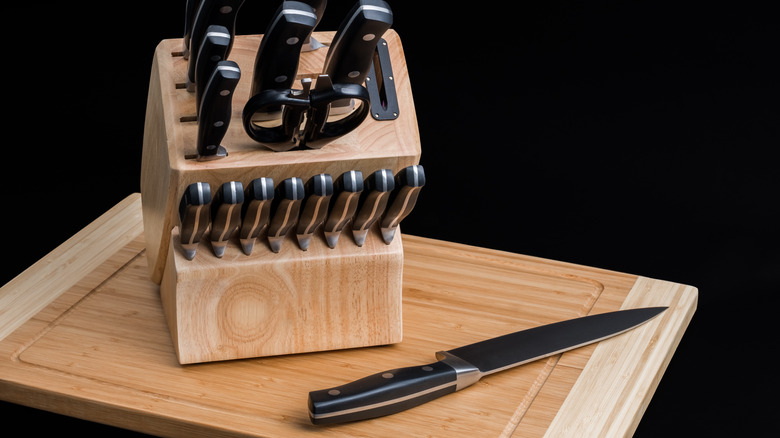

Views: 222 Author: Ella Publish Time: 2025-05-31 Origin: Site








Content Menu
● The Legacy of Korean Knife Craftsmanship
● Leading Knife Block Manufacturers in Korea
>> 1. Master Shin (Anseong Daejanggan)
>> 2. LeeKnives
>> 3. Everwealth Knife Factory
>> 4. Holy Industries Co., Ltd.
● Crafting Process: Traditional Meets Modern
● Why Choose Korean Knife Blocks?
● The Global Impact of Korean Knife Manufacturers
● Innovations and Trends in Korean Knife Manufacturing
● Frequently Asked Questions (FAQs)
>> 1. What makes Korean kitchen knives unique compared to Japanese or Western knives?
>> 2. Are Korean kitchen knives suitable for professional chefs?
>> 3. Where can I buy authentic Korean kitchen knives internationally?
>> 4. How should I care for a traditional Korean carbon steel kitchen knife?
>> 5. Are Korean kitchen knives affordable compared to other Asian knives?
Korea has a rich tradition of metalworking and craftsmanship, which extends impressively into the kitchen knife industry. The country's knife block manufacturers combine traditional forging techniques with modern manufacturing processes to produce high-quality, durable, and aesthetically pleasing kitchen knives. This article explores the top knife block manufacturers in Korea, their unique craftsmanship, product offerings, and why Korean knives are gaining global recognition. Alongside detailed descriptions, the article includes multimedia references to illustrate the artistry and technology behind these manufacturers.

Korean knife making is deeply rooted in history, with artisans like Master Shin In-young, who is recognized as an Intangible Cultural Heritage Treasure by Korea's Gyeonggi Province. His family-run blacksmith shop, established in 1845 in Anseong, is the oldest in Korea and continues to produce hand-forged knives using traditional carbon steel and wood materials. These knives feature sharp, hard blades combined with rustic wooden handles, reflecting centuries of Korean metalworking expertise.
Korean knives are often distinguished by their balance between sharpness and toughness. Unlike some other Asian knives that prioritize extreme sharpness at the cost of fragility, Korean knives are designed to be resilient and versatile, ideal for a variety of kitchen tasks. This balance is achieved through meticulous forging and heat treatment processes that have been refined over generations.
Master Shin's knives are renowned for their traditional forging methods using repurposed railroad track steel, which is rich in manganese, providing exceptional hardness and wear resistance. The handles are crafted from naturally dried chestnut wood, making them lightweight and rot-resistant. His signature “dang ghi” X banding technique on handles adds a distinctive aesthetic and functional grip. These knives are highly sought after by collectors and professional chefs alike for their balance of tradition and performance.
What sets Master Shin apart is the dedication to handcrafting each knife from start to finish. The forging process involves heating the steel until it glows red-hot and hammering it into shape on an anvil. This labor-intensive process ensures the blade's molecular structure is aligned for maximum strength and sharpness. The finishing touches, including polishing and handle fitting, are done with equal care to maintain the knife's heritage and functionality.
With over 30 years of experience, LeeKnives specializes in a wide range of knives including kitchen, pocket, and handmade knives. They combine CNC machining technology with traditional hand-finishing to ensure precision and aesthetic appeal. LeeKnives offers customization options for branding and handle design, making their products popular for both professional use and gifting. Their knives are durable, sharp, and suitable for heavy daily use in professional kitchens.
LeeKnives places a strong emphasis on innovation while respecting traditional craftsmanship. Their use of CNC machines allows for consistent blade geometry and sharpness, while the hand-finishing process ensures each knife has a unique touch. This hybrid approach results in knives that meet the high standards of professional chefs while maintaining artistic value.
Everwealth operates a 5,000 square meter facility with over 15 production lines, producing approximately 2 million knives monthly. They focus on large-scale production with a specialization in metal, wooden, and plastic handle knives. Everwealth's automated polishing and robotic assembly lines, combined with skilled human inspection, ensure consistent quality. Their ergonomic handles and sharp blades reduce fatigue and enhance performance, making them a preferred partner for international brands.
Everwealth's commitment to innovation is evident in their research and development efforts. They continuously explore new materials for handles, such as eco-friendly composites and treated woods, to improve grip and durability. Their blades often incorporate advanced stainless steel alloys that offer excellent edge retention and corrosion resistance, meeting the demands of diverse culinary environments.
Holy Industries is known for producing customized kitchen knives with strict quality control. They emphasize ergonomic design, corrosion resistance, and durability using premium stainless steel alloys and advanced heat treatment processes. Their knives are widely used in professional kitchens and by culinary enthusiasts, reflecting a balance of craftsmanship and modern technology.
Holy Industries' customization services allow chefs and brands to tailor knives to specific needs, including blade shape, handle material, and engraving. This flexibility has made them a favored manufacturer for boutique kitchenware brands and culinary schools seeking specialized tools.

The process of making Korean kitchen knives is a fascinating blend of age-old techniques and modern innovation. Videos documenting the forging process show master blacksmiths at work, hammering steel into shape, folding layers for Damascus patterns, and hand-finishing each blade to perfection. These artisans often use carbon steel for its sharpness and edge retention, combined with wooden handles carefully selected and treated for durability.
Modern factories complement these traditional methods with precision machinery that enhances blade consistency and sharpness. Heat treatment ovens precisely control the blade's hardness, while robotic polishing lines ensure a smooth, mirror-like finish. Despite automation, many manufacturers maintain a human touch in quality inspection and final assembly to preserve the knives' craftsmanship.
Korean knife blocks are not just functional kitchen tools; they are a testament to craftsmanship and cultural heritage. The top manufacturers in Korea provide:
- Superior Sharpness and Edge Retention: Thanks to high-quality carbon steel and advanced heat treatments.
- Ergonomic and Durable Handles: Crafted from natural woods like chestnut and hickory, designed for comfort and longevity.
- Aesthetic Appeal: Combining rustic traditional styles with modern design trends.
- Versatility: Suitable for professional chefs and home cooks, accommodating various culinary styles.
- Customization: Many manufacturers offer personalized engraving and handle designs.
Additionally, Korean knife blocks often come with thoughtfully designed storage solutions that protect the blades and organize the kitchen efficiently. These blocks are made from premium woods or composite materials, complementing the knives' craftsmanship and enhancing kitchen aesthetics.
Korean knife block manufacturers have steadily increased their presence in international markets. Their reputation for quality and affordability has attracted culinary professionals and enthusiasts worldwide. Many Korean brands collaborate with global distributors to offer knives that meet international standards and preferences.
The rise of Korean cuisine globally has also fueled interest in Korean kitchen tools. As Korean food gains popularity, so does the demand for authentic Korean knives, which are ideal for preparing traditional dishes like kimchi, bulgogi, and bibimbap. This cultural connection adds to the appeal of Korean knives beyond their technical merits.
The knife industry in Korea is evolving with new trends and innovations. Some manufacturers are experimenting with hybrid materials for handles, such as stabilized wood and resin composites, to enhance durability and moisture resistance. Others are incorporating Damascus steel patterns, which not only improve blade strength but also provide striking visual appeal.
Sustainability is becoming a focus, with manufacturers adopting eco-friendly practices in sourcing wood and metals and reducing waste during production. Some companies are also exploring recyclable packaging and carbon-neutral manufacturing processes to appeal to environmentally conscious consumers.
Korea's top knife block manufacturers represent a unique fusion of tradition and modernity. From the hand-forged masterpieces of Master Shin to the high-volume precision production of Everwealth and the custom craftsmanship of Holy Industries, these companies uphold Korea's reputation for quality and craftsmanship in kitchen knives. Whether you are a professional chef or a cooking enthusiast, Korean knife blocks offer exceptional performance, durability, and beauty. Their growing international presence is a testament to their excellence and innovation in the global cutlery market.

Korean kitchen knives often feature a blend of traditional forging techniques and modern manufacturing, using high-carbon steel for sharpness and durability. They tend to have ergonomic wooden handles and a rustic aesthetic, combining the best of both worlds between Japanese precision and Western robustness.
Yes, many Korean knife manufacturers produce knives specifically designed for professional use, offering excellent edge retention, balance, and ergonomic handles that reduce fatigue during long hours of cooking.
Authentic Korean kitchen knives can be purchased through specialty retailers, official distributors, and online platforms that partner with Korean manufacturers like Master Shin, LeeKnives, and Everwealth.
To maintain a carbon steel knife, it's important to hand wash and dry it immediately after use to prevent rust. Regular honing and occasional sharpening will keep the edge sharp. Applying a thin coat of oil can also protect the blade from corrosion.
Korean kitchen knives vary in price depending on craftsmanship and materials. While handcrafted knives like those from Master Shin can be premium-priced, many manufacturers like LeeKnives and Everwealth offer affordable options with excellent quality, making Korean knives competitive in the Asian knife market.